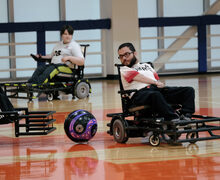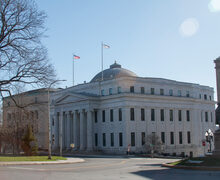Department revamps math major
Syracuse University students will soon have an easier time declaring math majors.
Currently, students must take a three-course calculus sequence before they can declare a math major. That requirement will be eliminated when the changes approved by the University Senate Curriculum Committee take effect for the fall 2006 semester.
The committee approved the change in requirements last fall, as well as changes to the math major curriculum.
‘Students will be able to declare majors whenever they want,’ said Terry McConnell, chair of the mathematics department.
Recent lows in the number of students who graduate with math degrees – about 15 per year in the mid-’90s, McConnell said – are part of the reason for these changes.
But those numbers have since improved, said McConnell, who estimated about 30 to 40 math majors are in this year’s graduating class. The decision to make declaring a math major easier was intended to further increase them.
The changes are also designed to create a group identity, which is lacking among math majors, McConnell said.
‘We really didn’t have a sense of community,’ he said.
The approved changes in curriculum streamline math majors’ course choices, McConnell said. A single list of courses will allow students to build relationships as they take the same classes together.
‘When you bring students together, it puts them into a position to learn from one another,’ McConnell said.
Recalling his own experience as an undergraduate at Princeton University, McConnell said he learned more from interacting with his fellow undergraduates than from lectures.
‘There is nothing that focuses your thinking more clearly than explaining (what you have learned) to others,’ he said. ‘You never really understand something until you teach it.’
However, senior Steve Nydick, a psychology major, said he thought the department should also offer separate tracks for applied and theoretical mathematics.
The opportunity to focus on one area would encourage more students to dual major in math, particularly students who plan to attend graduate school for majors that do not need abstract mathematics, Nydick said.
But Nydick said he thought it was necessary to create an identity for math majors.
‘If you have that sense of community, it’s less isolated,’ he said.
Most math majors are dual majors, Nydick said. They tend to work with students who have the same respective dual major.
Angela Dawson, a senior math and physics major, disagreed.
Because math majors must take courses in various fields of mathematics, some of which are not related to their area of interest, they meet students with different dual majors, she said.
‘We all just mix together,’ Dawson said.
Dawson is also involved in the academic fraternity Pi Mu Epsilon, which promotes the math major on campus.
First founded at SU in 1914, PME has since become a nationwide organization with more than 300 chapters.
The SU chapter became inactive, but it was revived recently and held its first meeting last year, Dawson said.
‘A lot of people know me because I’m in the club,’ Dawson said. ‘I can go to (Carnegie Hall) and get help from people.’
PME organizes lectures and other math-related social events, including an origami night last month.
PME’s revival is one of several other community-oriented steps taken by the SU math department during the last two years, McConnell said.
Dinners hosted for math majors and annual prizes given to distinguished undergraduates have been supported by an endowment fund founded in 1997, he said. Contributors to the fund are mostly former students and other people affiliated with the math department.
Published on March 7, 2006 at 12:00 pm




